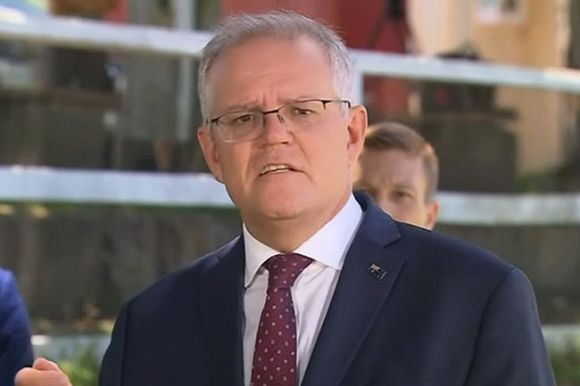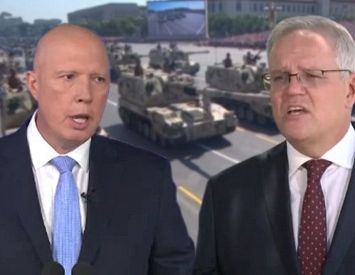The idea of the Morrison Government holding office took another blow with this year’s first Newspoll, offset only by the thought that in unstable times, usual omens may not count.
In the poll, long seen as the key indicator of voting trends, the Morrison Government trails Labor by 12% — 44 to 56.
The opening of the Election season had started the day before Australia Day with Prime Minister Scott Morrison himself heavily marked in as a leading issue.
AN ELECTION ABOUT SCOTT MORRISON?
The Prime Minister officiated that day at the Australian of the Year awards, where he was snubbed by the 2021 incumbent Grace Tame. Perhaps vividly mindful of his famous dismissal in Parliament of a major womens’ protest, she declined to speak to him.
It was his strongest freezing out since the President of France, when offered a “photo opportunity” with Scott, called him a liar, or since numerous victims of the 2020 bushfires called him a “dickhead”.
On the same day, Opposition Leader Anthony Albanese outlined his argument for the Election at the National Press Club, making a case for more interventionist government, built around an attack on Morrison as an incompetent delivering too little too late, with character failings — always dodging responsibility.
The idea of Morrison on the nose, the man who fails in any crisis, has some support in the approval ratings. The worst is the latest, the January Newspoll, that now gives him a deficit of disapproval over approval of 11% — against Anthony Albanese on zero. His lead as preferred prime minister over Albanese, incumbent or not, has collapsed — down from 9% to 2% in a month.
POLLS BAD FOR LIBERALS
More substantially, in conventional election arithmetic, the Liberals’ polls on voter intention are so bad, two to four months out from elections, that this Government, with already the smallest majority – 76 out of 151 seats – should not hope to get returned.
Two recent national polls agreed with Newspoll, giving Labor strong two-party preferred leads – of 55-45% and 53-47% – and as the conventional arithmetic works, minds get made up some time out before polling day, even two years out. A sudden late return of lost votes to the incumbent party can easily happen, but not all the lost votes come back and with wide margins established, not enough to save them.
Incumbents in even traditionally conservative seats, at this date, are threatened by swings going up to 10%. Labor leads in all states but Queensland, where it is nevertheless getting a 7% swing, promising to return much of the support it disastrously lost in 2019.
Except the times are too unconventional to make it that easy, to permit putting much faith in conventional expectations of what will happen.
On one hand, in times of stress, if there’s a swing on, it can generate its own mood and go through like a tsunami, removing government seats never expected to be touched.
On the other hand, the economic shock that came with the pandemic– that plus several years of low interest rates, still very weak inflation, then stimulus funding paid to millions – has destabilised things enough to discourage any heavy betting.
With a lot of money around, some people will get a lot of it, consider they are doing well and decide it is far better to leave things as they are.
Make a quick survey of the big numbers of large, new, expensive vehicles on the road, sure-fire creators of a sense of well-being — cheap money has done that. Likewise, the distortion of real estate prices; buyers are paying heavily, which the cheap money again makes possible — sellers can join the ranks of the self-satisfied.
The Federal Treasurer, Josh Frydenberg, added in on 31 January that private savings had built up to super-healthy levels during the pandemic — to $424 billion. Who’s got money and feeling good about it?
MONEY, SMUGNESS AND NO CHANGE
The smugness factor cannot be overlooked; if doing alright, you are less affected by the crisis that’s damaging other people’s lives.
Consider the self-funded retirees who clearly produced a Liberal voting bloc in 2019. Spending the afternoon at the computer screen working the investments has become grandfather’s chief engagement in many households.
The trimming of Capital Gains Tax discounts for landlords and stopping the blow out of cash refunds for excess franking credits, proposed in 2019 by Labor, were tightly scrutinised by many such screen-bound electors. Some also pretended to believe the stories then kicked up about a death tax on the way. Middle-class welfare, however well camouflaged as earning, is much prized.
Consider the woman who changed from Labor to Liberal because of the franking credits issue, saying the accountant had done so well working the system for her, these concessions were paying the bills. She stuck with the private shares portfolio, not so far having occasion to start drawing on her superannuation — the whole lot of that accumulating as a preserved benefit.
One old couple sold their beautiful Queenslander on a prestigious Brisbane terrace for $4 million or more, moving to a luxury townhouse that cost $1.5 million. If ever they voted for the Liberals they would certainly not stop.
One outside possibility of a Queensland sleeper is that state’s rating, in Newspoll, of the pandemic as the leading political issue. Protected until Christmas, voters in Queensland are now enduring the full brunt of infection, deaths, paralysis over efforts to get tested. Will they blame the Federal Government over multiple failings, as in aged care or testing kits, or punish the Labor Party, because the Labor State Government gave in to Morrison over “let it rip”?
In such perverse ways, the volatility factor also can play its part against Labor’s hopes. Ironically, the destabilising performances of Prime Minister Scott Morrison and the widely-acknowledged arrogance of his slow-to-act regime might generate so much confusion that cold and conventional reasoning will no longer apply. Mark in a larger-than-ever unpredictability factor.
LABOR’S TO LOSE?
Offset all that by factoring in privation and despair affecting very many Australians — dire personal loss from the pandemic and its impacts. That is the kind of dispersed suffering that happens even in “normal times” if a recession comes along. Voters feel they have to do something to get out of a bad situation and almost no government can survive.
Scattered polling is showing that hard-to-pin-down young voters, 18-24s, key sufferers in this crisis, are opting for Labor by as much as 70% — a figure as yet looking a bit too wild for the Parties to believe.
In the balance of all this reasoning, as things are travelling, the Election in 2022 should soon be Labor’s to lose.
It can be disappointed by a repeat of the factors that beat it in 2019, but for that, the Liberals would need to do better in Queensland than at present and would have to rely on Labor to again frighten off many retirees.
Labor has 68 seats in the House of Representatives, needing eight to become a government. Labor and the Greens have together 35 seats (26,9) out of 76 in the Senate. That suggests obstruction of a Labor Government by a conservative Upper House.
Labor in a good year would have to overcome some abysmal past electoral performances in that zone, unlikely as that might seem, to get four more senators.
Dr Lee Duffield is a former ABC foreign correspondent, political journalist and academic.
Related Articles
- No, Morrison can’t avoid going to an election (and other stories)
- Change in voting system might save us all
- Liberal Party in fear of Independents
- Independents can revolutionise Australian politics
- KERRYN PHELPS: Coalition threatened by Independent movement
 This work is licensed under a Creative Commons Attribution-NonCommercial-NoDerivs 3.0 Australia License
This work is licensed under a Creative Commons Attribution-NonCommercial-NoDerivs 3.0 Australia License
Support independent journalism Subscribe to IA.















